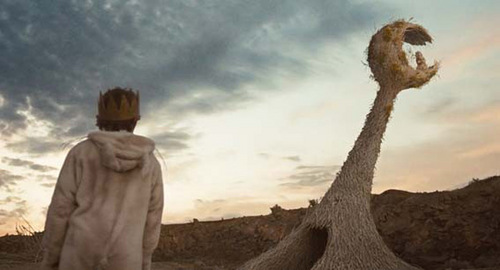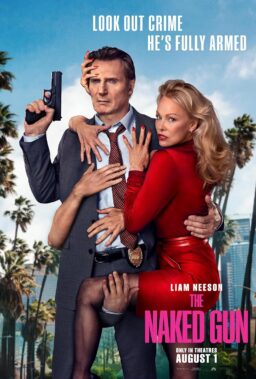In his groovy new iPhone app movie guide, my friend Leonard Maltin writes that “Where the Wild Things Are” “puts me in an awkward situation as someone who is supposed to deliver a clear-cut opinion of a film: I didn’t love it, yet there are passages in it that are so magical I don’t think I’ll ever forget them.” I’m with you there, Leonard. And because the lively discussion from my previous post about the movie, “Where the Mopey Things Are,” has been so stimulating, I thought I’d offer excerpts from two impressive reviews — one positive and one negative — with which I (almost) completely agree. That is to say, I can absolutely see how people might come down on one side or the other, but I remain ambivalently in-between.
First, from Ty Burr at the Boston Globe:
Let’s dispense with the preliminaries: What do the experts think of “Where the Wild Things Are”? As the end credits rolled, my 12-year-old daughter and her bestest friend turned to me with faces like the twin masks of comedy and tragedy on a Broadway playbill. One girl’s eyes were wet with tears of sadness and profound joy; “I loved it,” she sighed. The other looked as if someone had stuck an egg-beater in her ear and scrambled her brains. “That is not a children’s movie,” she growled.
They’re both right. […]
… James Gandolfini turns out to have exactly the rough-tough-creampuff vocal inflections a child’s best beast needs. When Carol sulks (which is a lot), it carries weight and it breaks your heart because that voice is so evenly split between menace and the cuddles. Gandolfini gives a great, awards-worthy performance and you never even see the man. [JE: Bravo!]
The original “Where the Wild Things Are” is a parable about self-control for very young children – about the joys and dangers of letting fantasy run free, and about learning for oneself when to rein it in. Jonze’s film (to which Sendak has given his blessing) visualizes the process of learning control, and its keynote is anxiety – the characters see and are saddened by the gap between what’s broken and how little we can do to fix it. Told the owls will answer only seven-word questions, Max asks “How do I make everyone O-K?” and the answer is an undecipherable squawk that means: Figure it out for yourself, kid.
Because Max is a boy and not a Wild Thing, we have faith he will. The moral is tucked away where you can’t see it, but it’s there. By this point you may have realized that this version of “Where the Wilds Things Are” isn’t about childhood at all but about childhood’s end and what’s gained and lost by it. That’s why very young kids, dull Disney princesses, overprotective parents, and self-serious grown-ups should probably stay away, while the college students after the screening I was at gathered outside and talked in low, exultant voices. That’s why the 12-year-old next to me wept: For everything from which she had so recently sailed away.
I love that. OK, I think the “moral” is so visible you can’t get it out of your face, and I can’t honestly know why the 12-year-old was crying (possibly because she was so bummed by the movie’s emotions), but I appreciate the sentiment and (as I said in my original post) I have no doubt that kids will directly connect with the cruelty and sadness they see on the screen.

Now, for a contrasting view, Glenn Kenny goes back for a second viewing at The Auteurs:
Don’t get me wrong: in terms of sheer filmmaking imagination and chops, it’s damned impressive….
My friend James Rocchi has marveled that this is “a film that knows about confusion and reality and sadness.” He is right, but then again, there’s the rub–the film is very much concerned that you understand that it knows about confusion and reality and sadness, it’s constantly tugging at your sleeve like a fidgety child to make sure of this. This concern is a hallmark of the work of “Where the Wild Things Are” co-screenwriter Dave Eggers. When Eggers’ McSweeney’s periodical first began appearing, various critics noted its antic, iconoclastic, often snarky tone, and in some cases came to the horrified conclusion that Eggers and his claque didn’t believe in anything. The thing is, he/they actually believed in plenty, that plenty often having something to do with childlike “wonder” and an eschewal of critical thinking. And when they did choose to tell you about something they believed in, they wanted to make sure that you understood that their sincerity in this regard was in fact almost painful. And what were YOU going to counter that with, huh?
That’s the stance that is behind some of the film’s most gut-churningly on-the-nose bits, as when the wild things actually ask their new “king” Max: “What are you going to do about, you know; what about loneliness?” and “What he’s saying is, will you keep out the sadness?” Maurice Sendak’s original book was about an awful lot of things (and with so few words!), one of which was the infectious fun of potentially destructive mischief-making. Here, the mischief is bombastic, ugly, and scored to Karen O’s lameoid simulation of a Go Team! song. The film knows plenty about confusion and reality and sadness, okay; it knows almost nothing about a good time, and laughter. (“Does anybody remember laughter?”–R. Plant) I swear I laughed more during Tarkovsky’ “Stalker” than at this film.
Talk about an awkward position. I don’t take serious issue with either of those takes. J. Hoberman (who also made a “group therapy” joke about the Wild Things) in the Village Voice captured the way I thought about the movie while I was watching it:
As its title suggests, “Where the Wild Things Are” is a book about the Freudian id–and it’s also a media saga, having served as the basis for an animated short, an opera, a ballet, and a museum exhibit, as well as a prop for child psychologists and some relatively discreet merchandizing. Thus tucked into a collective, multigenerational unconscious, the slender text exudes authority. Jonze has struggled to bring the book–which was to have been his first feature–to the screen for even longer than the eight years it took Sendak to finish it.
The result isn’t labored, so much as well-behaved. It’s difficult not to watch the movie as a series of decisions carefully made and problems responsibly addressed by Jonze and screenwriter Dave Eggers: Will the unruly protagonist Max remain a pre-literate five or be older? (Older.) Is the projection of his inner world best achieved through animation or puppetry? (Puppetry.) Natural or fantastic landscapes? (Both.) What sort of music will comment on the action? (Insipid indie rock.) But, mainly, if one is to make something more than a 10-minute short, how to open up the book?
So, what do you think about those decisions they made? To have Max literally bite his mom, for example? And to have him run away, rather than have his room change into a jungle? Or spend so much time on the semi-realistic boat journey over and back? Or to have the Wild Things embody different aspects of Max’s home life? Or to emphasize, if you will, the psychoanalytical over the Jungian, the literal over the metaphorical? (Or maybe you don’t see it that way at all…) Let us know.











